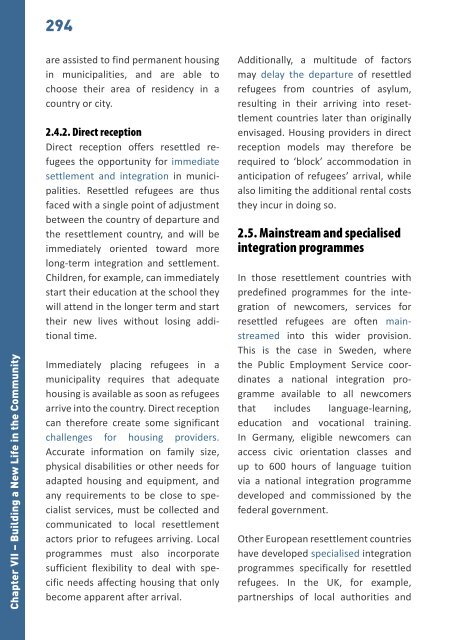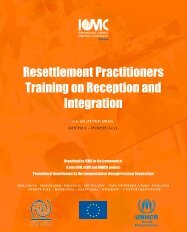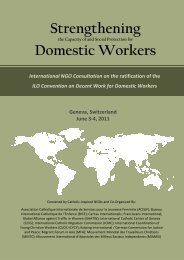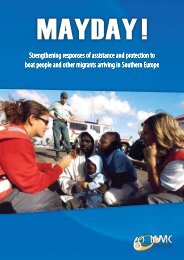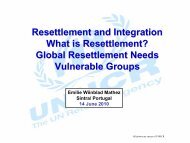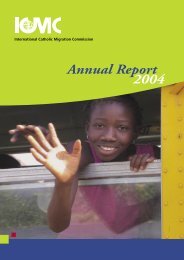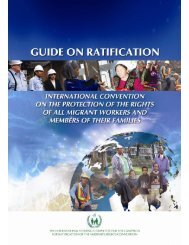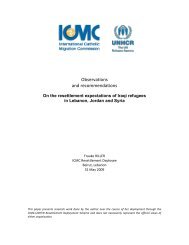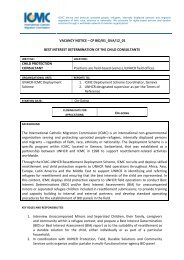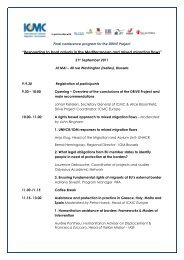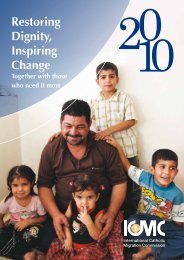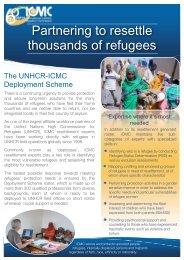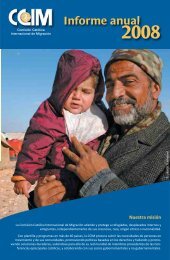ICMCEUROPE WelcometoEurope.pdf (5.89 MB)
ICMCEUROPE WelcometoEurope.pdf (5.89 MB)
ICMCEUROPE WelcometoEurope.pdf (5.89 MB)
You also want an ePaper? Increase the reach of your titles
YUMPU automatically turns print PDFs into web optimized ePapers that Google loves.
294<br />
Chapter VII – Building a New Life in the Community<br />
are assisted to find permanent housing<br />
in municipalities, and are able to<br />
choose their area of residency in a<br />
country or city.<br />
2.4.2. Direct reception<br />
Direct reception offers resettled refugees<br />
the opportunity for immediate<br />
settlement and integration in municipalities.<br />
Resettled refugees are thus<br />
faced with a single point of adjustment<br />
between the country of departure and<br />
the resettlement country, and will be<br />
immediately oriented toward more<br />
long-term integration and settlement.<br />
Children, for example, can immediately<br />
start their education at the school they<br />
will attend in the longer term and start<br />
their new lives without losing additional<br />
time.<br />
Immediately placing refugees in a<br />
municipality requires that adequate<br />
housing is available as soon as refugees<br />
arrive into the country. Direct reception<br />
can therefore create some significant<br />
challenges for housing providers.<br />
Accurate information on family size,<br />
physical disabilities or other needs for<br />
adapted housing and equipment, and<br />
any requirements to be close to specialist<br />
services, must be collected and<br />
communicated to local resettlement<br />
actors prior to refugees arriving. Local<br />
programmes must also incorporate<br />
sufficient flexibility to deal with specific<br />
needs affecting housing that only<br />
become apparent after arrival.<br />
Additionally, a multitude of factors<br />
may delay the departure of resettled<br />
refugees from countries of asylum,<br />
resulting in their arriving into resettlement<br />
countries later than originally<br />
envisaged. Housing providers in direct<br />
reception models may therefore be<br />
required to ‘block’ accommodation in<br />
anticipation of refugees’ arrival, while<br />
also limiting the additional rental costs<br />
they incur in doing so.<br />
2.5. Mainstream and specialised<br />
integration programmes<br />
In those resettlement countries with<br />
predefined programmes for the integration<br />
of newcomers, services for<br />
resettled refugees are often mainstreamed<br />
into this wider provision.<br />
This is the case in Sweden, where<br />
the Public Employment Service coordinates<br />
a national integration programme<br />
available to all newcomers<br />
that includes language-learning,<br />
education and vocational training.<br />
In Germany, eligible newcomers can<br />
access civic orientation classes and<br />
up to 600 hours of language tuition<br />
via a national integration programme<br />
developed and commissioned by the<br />
federal government.<br />
Other European resettlement countries<br />
have developed specialised integration<br />
programmes specifically for resettled<br />
refugees. In the UK, for example,<br />
partnerships of local authorities and


